View part 1 of this series here.
From Mai Thi Loi’s village, we head east, toward the coast, and descend from the mountains again to reach the home of Ngo Gia Hue, Tran Thi Thao and their daughters. It’s about an hour’s drive, not including a stop for lunch. This family also lives in a small village, at the end of a long dirt road. It’s still an agricultural area, and noticeably hotter than up in the mountains.
Ngo Gia Hue greets us as we walk up to his home. It’s a much bigger, airier place than Mai Thi Loi’s house, and feels much lighter and more welcoming. We sit down with Ngo Gia Hue in his front yard, surrounded by piles of peanuts, which is the family’s main crop. Tran Thi Thao, Mr. Hue’s wife, greets us from inside the house, where she is caring for her daughters Nhan and Toan. Mrs. Thao’s legs are not in good shape, we are told, and she walks on crutches while caring for her daughters.
We hear a little bit of the family’s story, already told by other AP fellows, from Mr. Hue, who does the talking during our conversation. Mr. Hue fought in the war and was exposed to Agent Orange; as with Mai Thi Loi’s family, the poison’s effects appeared in his children seemingly at random. Mr. Hue has had seven children with Mrs. Thao—the fourth died in infancy, but the first, second, and fifth were born healthy, and grew up to have families of their own.
Huong (their third child, now 33), Nhan (the fifth, now 26) and Tuan (the youngest, now 20) were not so fortunate. Mr. Hue tells me that all his children were healthy, normal babies, but as they grew up their mental and physical disabilities became more apparent. Today, all three are afflicted with severe dwarfism, have limited mental capacity and speech (Nhan has never spoken; the others can say a few words), and have a difficult time walking without assistance.
It’s somewhat of a shock to see Mr. Hue’s daughters and realize that, legally, they are all adults. I would have assumed them all to be preteen girls if I met them on the street, but Nhan is actually my age and Huong is several years older—I find it difficult to process that mentally. As we begin our conversation, I see one of the girls lying on a nearby hammock; this is Huong, the oldest. Huong doesn’t leave the hammock during our visit (I’m told she uses a wheelchair), but will sometimes absently looks over at our table for a moment before returning to our own thoughts. I once again find myself wondering how much of our conversation she understands. The other daughters, Nhan and Tuan, stay inside with their mother as we speak with Mr. Hue.
My visit marks a happy occasion for this family—AP donors have raised enough money to buy them a breeding cow and a calf, which I’m hoping we can deliver before I leave in August. The family had their own cow years ago, but had to sell it to pay for the education of their oldest daughter (who is healthy and now has her own family). According to Mr. Hoc, our AEPD outreach worker, the cow can bring in an extra 100,000 Vietnamese dong (around $4.40) per day for Mr. Hue, both by renting out the cow and using it to work on his peanut farm; the calf will eventually be sold. This will be a significant step up for this family, and a grateful and optimistic Mr. Hue tells me that the extra income from the cow and calf can be used to buy much-needed medicine for his daughters, which will help make their lives more bearable.
However, Mr. Hue tells me that even after receiving the cow and the calf he is unable to effectively treat Nhan, the sickest of his daughters. He can get medicine for Nhan from the hospital in the district, but it doesn’t help much, he says. Nhan has a stomach problem that requires surgery to fix, and Mr. Hue tells me that he’d originally planned to use the money raised by AP for this—he eventually realized that the surgery would be more expensive than he’d thought. In addition to the cost of the procedure itself, he’d also have to pay to bring Nhan to a larger hospital in the city of Hue, around 150 miles away; the local hospital can provide basic treatment but doesn’t have the resources to perform this kind of surgery. Now Mr. Hue wants to breed more cows he can later sell, and eventually save up the money for Nhan’s surgery; this could take a long time, though, and he’s hoping for more support. His other daughters also haven’t been doing very well—Huong was hospitalized last February for a goiter and other skin problems.
I ask for more details about where the family is financially, and Mr. Hue tells me that he’s really hoping to get the cow and the calf by the end of this year. That way, he can sell the calf next year for 12 million Vietnamese dong (around $525) and breed the cow again sooner. Once again, I’m powerless to promise anything, only telling Mr. Hue that I’ll do whatever I can to make sure his family gets that money.
Since our visit last year the family’s roof has been fixed, thanks to a donation from the Red Cross, but Mr. Hue tells me he still has loans to pay back for other repairs. He’s also raising peanuts, but he says he only expects to earn around 7 million dong from his peanut operation this year—that may sound like a lot, but Ngoc adds in a worried voice that it’s a very small amount to support a family (just over $300). Mr. Hue has a few chickens (who skitter around the yard as we talk) and a dove, but he tells me they haven’t been that profitable; he hopes to buy more and scale up his business.
Mr. Hue seems optimistic about the cow and calf, assuring me that those resources will be a big help to his family. Yet even after a leg up toward building a stable source of income, the family will still be relatively poor, Mrs. Thao’s legs will still be in bad shape, and Mr. Hue’s daughters will still be sick, with little hope of significant improvement. I’m reminded, once again, that when it comes to something like Agent Orange there are no truly happy endings, no triumphs of adversity. Disabilities like those affecting Mr. Hue’s daughters can’t be cured—all medicine can do, all caregivers and groups like AEPD can do, is to make people’s lives easier to cope with. The cow and calf won’t fix everything, but at least the family will have less financial pressure on them because of AP and AEPD’s support. That’s something, anyway.
Before getting up to take pictures I ask Mr. Hue about how the community has treated him and his family, and he is quick to assure me that people are very understanding, and that they pitch in to help his family in times of need. But he adds that this is a poor area and there’s only so much help his neighbors can give, and only so much time they have to spare for his family. He does say that he’s very active in the local support group for disabled people, a project run by AEPD that creates communities of disabled people in each local commune. Mr. Hue tells me that he’s received training in animal husbandry and community-based rehabilitation through the support group, which has helped his family and his business a great deal. It’s a nice reminder of the scope of AEPD’s incredible work, of which the Agent Orange project to which I contribute is only a small part.
I photograph Huong and then go inside to photograph the other two girls with their mother; they don’t seem enthusiastic but also don’t resist being part of the picture. I’m told that during AP’s visit last year they had been much shier and refused to be photographed. Maybe this is a sign of improvement. As I prepare to leave Mrs. Thao and Mr. Hue both shake my hand and thank me; Mrs. Thao seems tired and frail, but Mr. Hue, though an elderly man, seems healthy and in fairly good spirits. I leave hoping that we can get the cow and calf to this family soon, to ensure that their daughters can get the care they deserve.
One postscript for this visit: I did not pick up on this at the time, but Dat, our associate, later tells me that the family only has one electric fan in their home to stave off the heat, and during our visit they brought the fan outside to cool us off, leaving Mrs. Thao and two of her daughters inside the sweltering house. That day’s weather was notably hot—I hadn’t been drinking enough water, and by the end of our visit I was having trouble remembering my questions—and thinking about those people giving us their only means of staying cool made both Dat and I feel a bit guilty, and even more determined to do what we can to help them.
Posted By Jacob Cohn (Vietnam)
Posted Jun 28th, 2017


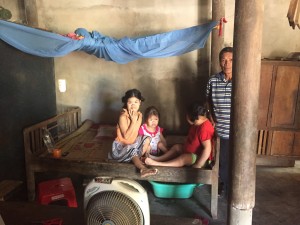
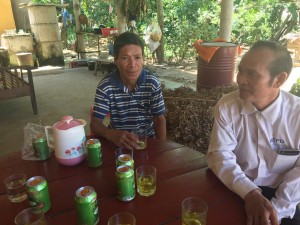
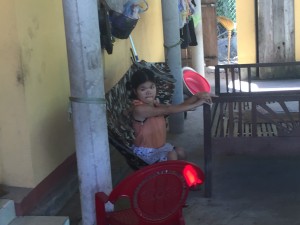
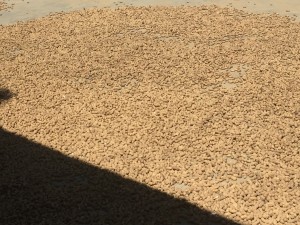
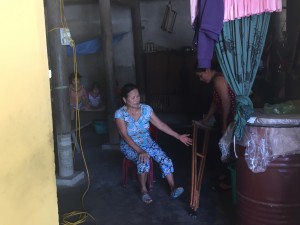
5 Comments
Bri
June 28, 2017
This series of stories was quite eye-opening and you have clearly put a lot of thought into telling them authentically. It’s good to know that even though the problems caused by Agent Orange can’t exactly be solved, AEPD’s work gives families a way forward.